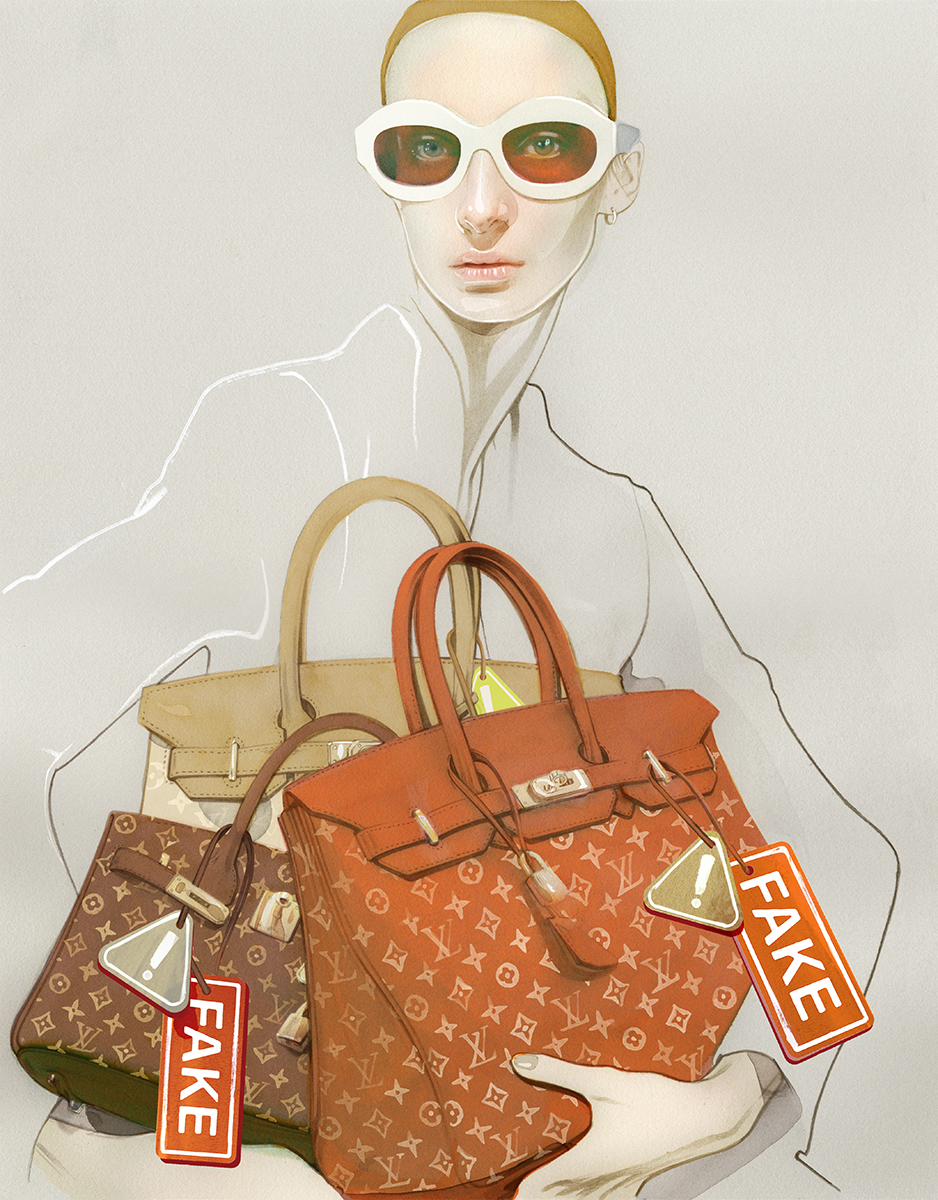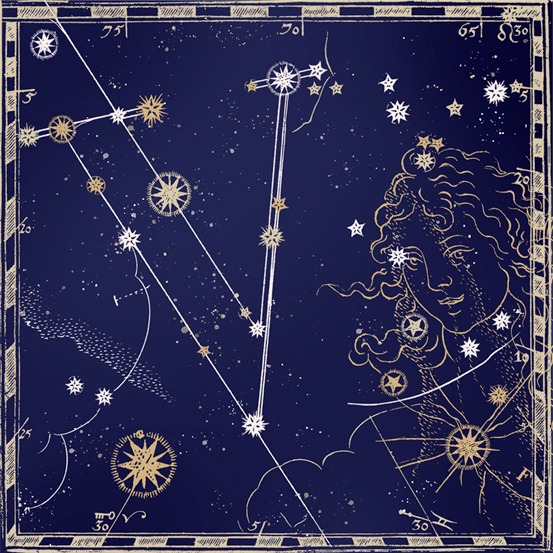Madeleine Albright said that "there is a special place in hell for women who do not help other women." We add, certain that we would have her approval, that this place will also be occupied by women who buy counterfeits.
Madeleine Albright said that "there is a special place in hell for women who do not help other women." We add, certain that we would have her approval, that this place will also be occupied by women who buy counterfeits.

You don't have to look too far to be confronted, in the midst of videos that comply with your algorithm, with a mechanical voice announcing "Prada bag finally restocked" as dozens of bags - all wrapped in greasy plastic - are thrown onto the floor of what appears to be a warehouse of dubious conditions. The message "only 450" appears in bold letters on the screen, as if to indicate that each of those finds will cost "only" 450 dollars (about 410 euros). At first glance, and probably at second, and third, any human being - even those who don't know who Miuccia Prada is - can see that none of those pieces are real, such is the appearance of the square-shaped "boxes" with gold chains that someone rushes to dump, as if they were garbage. Still, the video has more than 300 comments, with users thirsting for information: from the delivery service to the payment method, it's quite possible that all those bags will be sold while the devil rubs an eye; amidst the joy of finding something "so cheap" (?), no one questions the fact that those 450 dollars are an investment in vain, because none of it is Prada, neither in the virtual world nor outside it. Apparently, that's irrelevant. Those who follow this small women's clothing store (whose size is nothing like others, which have thousands of followers and advertise in a much more "pornographic" way that they have fake bags "just like the originals" of all possible and imaginary luxury brands) are looking for a logo, an approximation to some kind of dream.
Welcome to the fabulous world of TikTok, where the counterfeiting of luxury goods is discussed as shamelessly as a WhatsApp conversation about the best place to dine out. Alongside Instagram and Reddit - where there are dozens of groups debating the best way to buy fakes, like an organized mafia - the Internet is an underworld full of petty criminals who don't shy away from trying to "fleece" buyers who are foolish enough to pay the real price for a Diana (Gucci) or a Puzzle (Loewe) - and, of course, the brands, who have taken years and years to make a product desirable, annihilating not only the value of their intellectual property and creativity, but the entire production chain that goes with it - indeed, if we get outraged whenever a fast fashion brand copies the work of an independent artist, where does that outrage go when it's a "big" brand being copied? Just because there's more money involved there should be no respect? Because that's precisely what these Internet users, who spend hours on forums detailing the vendor who best copies X or Y wallet, think: that not only are they above the law, but that they have a secret all of their own, that makes them stupidly smarter than everyone else. Are they? Or are they just fulfilling a deeper need that has nothing to do with acquiring goods? When you ask someone about fakes, often the answer that comes from the other side is "But why should I pay € 5.000 for a bag?". That's the thing. No one has to pay € 5.000 for a bag, because it is not for sale under coercion - no one is pointing a gun at you in the street and saying "Either you buy this € 5.000 wallet or you get shot."
In the same way that it is quite likely that we will spend a lifetime without owning a Ferrari, or a penthouse in New York, or a private jet, it is quite possible that we will not be able to afford a multi-digit designer piece - and that's okay. Or it should be. Our happiness does not depend on what we carry on our shoulder. Anyone who argues, "But why should I pay € 5.000 for a bag?" immediately shows a symptom: that although they don't want to/can't pay that amount, they think they are entitled to have that same good that they somehow refuse. The point is that they do not. As the saying goes, the universe owes us nothing. There are dozens and dozens of small brands and designers (with incredible talent, mind you) whose careers would benefit tremendously if everyone willing to pay 450 euros for a fake Prada invested in their creations. The problem lies in the perception that this fake Prada produces - in them and in others. In fact, the problem is more deep-rooted than it appears. This is not a new dilemma. Counterfeit products have always existed, just think of the street traders who, more or less openly, sold items in big cities, on beaches and at fairs.
Their approach ("Ma'am, I have this Chanel almost like the real thing!") was almost sincere, close to what you find today on many counterfeiting websites. In the last decade, with the boom of "luxury" online stores, the focus of the business has changed. Now what is offered are "authentic copies", so authentic that almost no one can tell them apart from the originals. They are called superfakes. How did we get here? Lara Osborn, VP, Procurement and Authentication at Fashionphile (one of the most relevant sites for buying and selling ultra-luxury goods), has a theory: “As the race for the next ‘it’ bag grows, and designers become more strategic with their launches, not to mention the ever-increasing social platforms that fuel awareness, the market share potential increases for counterfeiters. Pair that with supply chain improvements and advancements in design technology (think fast fashion), and it has become more possible and lucrative than ever before to create high quality replicas of the top selling and newly dropped designs. We’re also going through an unfortunate trend right now, especially with inflation still raging, where ‘dupes’ and 1:1’s are acceptable and even celebrated in certain circles.”
The celebration Osborn alludes to is one of the strangest mysteries of recent times: ultra-rich, high-powered women who have a closet full of fake Birkins. And they make a point of saying so, as has happened more than once with American millionaires, who flaunt their fake purses in videos made in their million-dollar mansions. Given this spread of superfakes, how does all this affect the authentication process? “At Fashionphile, we have been in the authentication world since the onset of the US handbag resale market, and it’s really just second nature for us, at this point. What is deemed a super fake by the media is typically very identifiable as a counterfeit to our authentication team, largely due to their experience and mass exposure to truly authentic luxury goods.” Lara's words are a balm, perhaps supported by Fashionphile's track record, but it is well known that not all second-hand websites work like this - there are several sites where the authentication teams are composed of people without sufficient knowledge to attest to the veracity of a piece. Forbes did an article on this in 2019, and there are more and more negative experiences shared by Internet users who believed they were buying a real Dior... and received a fake one.
When you consider that our lives are now monitored 24 hours a day, how does all this go on without anything happening? Apparently, counterfeiting is a crime - it is. Yet thousands upon thousands of people don't mind getting caught in this web - which can incur prison sentences - that involves both buyers and producers. Which brings us to a question: if most of these knockoffs come from China, how do they manage to cross borders, with so much legislation already in place - notably in countries like France, where counterfeiting is a serious crime - to detect them? Sarah Davis, founder and CEO of Fashionphile, explains that the means are still scarce: “There may be legislation, but there are no authentication expert teams or tools available to customs officials to identify the higher quality counterfeits that are mixed in with authentic products crossing our borders every day.” Consequently, the impact of this "side business" on the economy and ultimately on the intellectual property of the authors of these pieces is huge, as Davis attests:“Counterfeiting has real life implications on our economy. Not only is it literally “the largest criminal enterprise in the world” but counterfeit sales have been proven to displace jobs here domestically. Finally, when counterfeits are so close to “the real thing” it really does damage the brand. Why ever pay for an authentic item if no one can tell and others are carrying what looks identical to basically everyone, for a small fraction of the price. Especially when these fakes are flooding the market.” Still, and no matter how "close to the real thing" these counterfeits are, they will never be the real thing. What does someone who spends $800 on a fake Chanel expect to get out of that purchase? “A person spending $800 or more on a counterfeit Chanel bag, hopes to look like they’re carrying an authentic Chanel bag without paying the 11 thousand dollars that they’d have to spend to get one.”The old imposter syndrome, once again. Fake it till you make it. But it should not be forgotten that the first to be fooled is the buyer of the fake Chanel, the rest are just casual onlookers.
* The title of this text is an allusion to a campaign against counterfeiting launched in 2012 by a group of French luxury brands. At the time, several billboards with ironic slogans (the use of the word ladies was a pun on the image of the Lady Dior handbag, which appeared in the foreground) were scattered around French airports in the summer months to raise awareness of the problem. The billboards read: "In France, buying or transporting a fake product is an offense punishable by up to three years in prison and a € 300.000 fine."
Translated from the original on The [Un]Popular Issue, published July 2023.Full stories and credits on the print issue.
Most popular
.png)
Os 7 momentos mais emblemáticos de Jourdan Dunn ao longo da sua carreira na Moda
19 Jun 2024

.png)
Becoming Karl Lagerfeld | Os bastidores da série numa entrevista com os criadores
15 Jun 2024
Relacionados
 (1).png)
.png)



